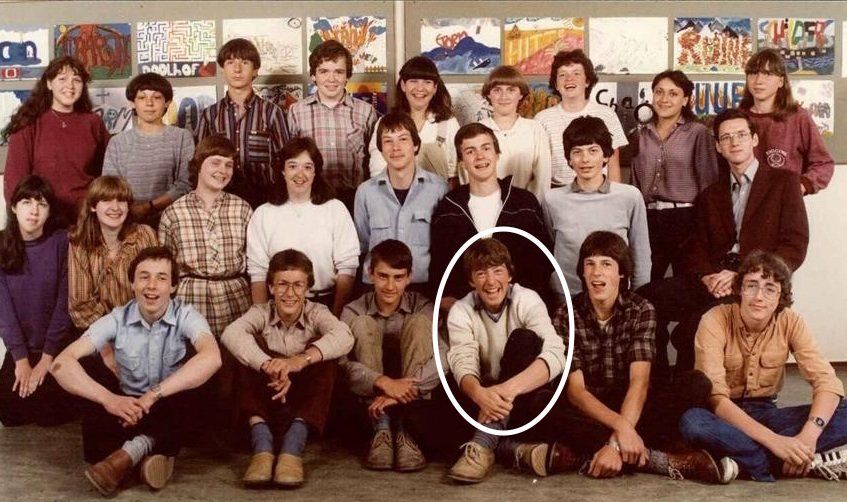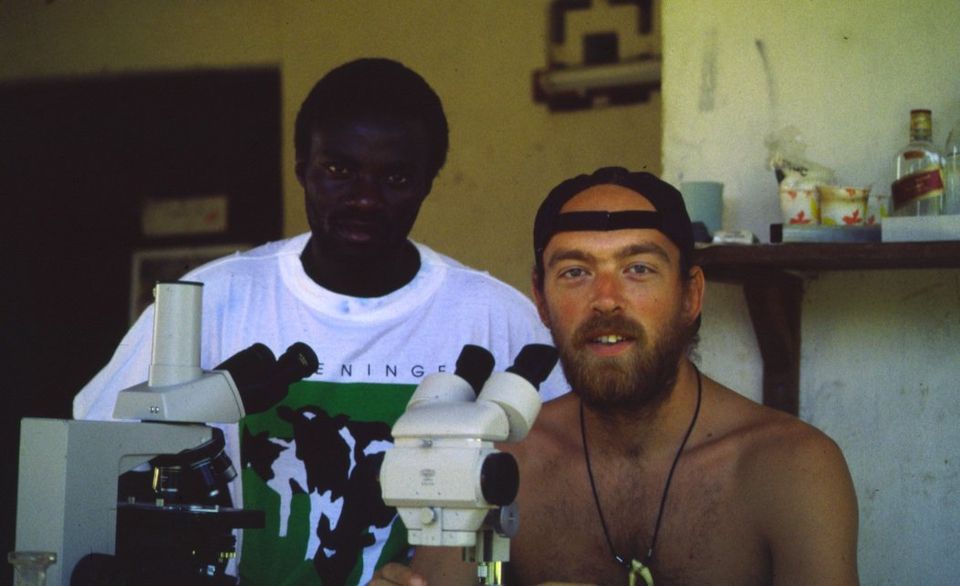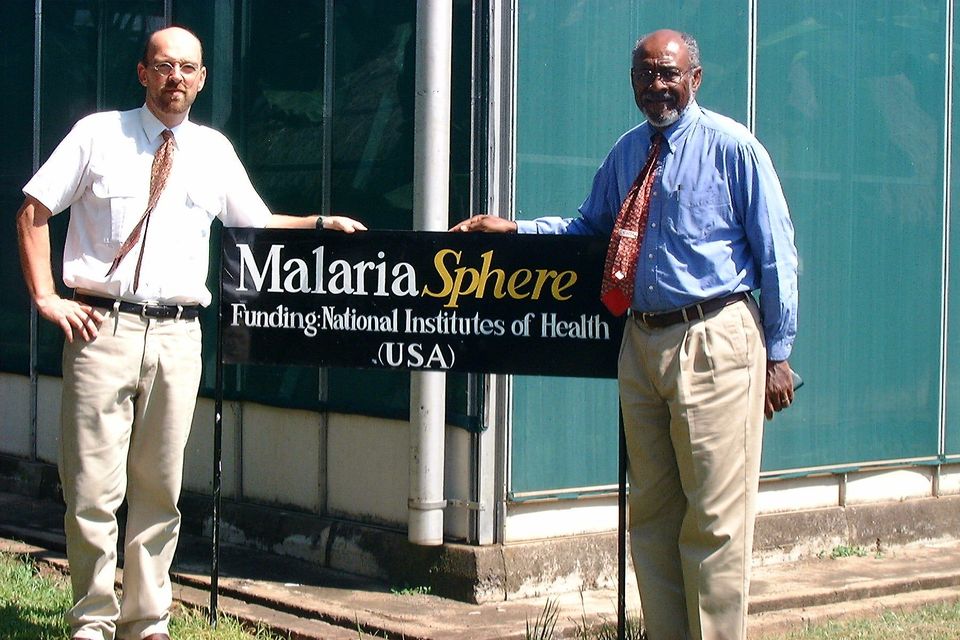BIOGRAPHY
Early years
I was born on 6 September 1965 in the small town of Meerssen, in the south of the Netherlands. Early on in life I became fascinated by nature and particulary by all the creepies and crawlies in it. Wherever my parents played tennis, I would be under the bushes looking for interesting 'wildlife'. I joined a nature club at the age of ten, and became a fanatic bird watcher until the age that I started looking at other birds. Birds and playing guitar (Young, Dylan, Fleetwood Mac, Stones) dominated my secondary school life. Certain that biology would be the study of my choice, I neglected pretty much anything else during that period.

Into Africa
In September 1983 I started as a first-year biology student at the internationally renowned Wageningen University, and a new world opened up to me. Immediately, the international character of the University appealed to me, and it became obvious that I wanted to do something with biology in developing countries. Then the day came when I attended a lecture on the terrible side effects of aerial spraying with insecticides against tsetse flies in Africa - and was hooked immediately. Insects and the diseases they transmit to humans and animals, as well as searching green alternatives for their control, grasped my interest. Soon afterwards, before reaching the age of twenty, I got a life-changing opportunity presented to me. I was offered a chance to work in a Maasai community on the Kenya-Tanzania border for a year. To develop low-cost odour-baited traps for the control of tsetse flies. To be in Kenya's Rift Valley weeks after I saw the blockbuster 'Out of Africa' was sheer magic. That year, in a lone field station, with a Landrover surrounded by ten thousand square kilometres without another car did it for me. I fell passionately in love with Africa, its people, and its nature. Looking back now, with eleven years of working and living in East and southern Africa, the dream came true.
After returning from Kenya in the summer of 1987, I focused the remainder of my studies on all that was needed to prepare myself for a new adventure in Africa. In 1989 I worked for the first time with malaria mosquitoes and studied their flight behaviour in a plume of human odour inside a small windtunnel. Working in the dark in the basement of the department, with insects that feed on your blood, and are responsible for more than a million deaths per year, had something special to it. I worked day and night on my MSc thesis, hooked again to this fascinating study, and was thrilled to graduate cum laude in September 1989. Weeks afterwards (to avoid the draw by the army) I was on the plane to Zambia, where in its western province I again started to work on the control of tsetse flies. This time in an operational setting, where I took my first lessons in rolling out elimination campaigns that later proved so valuable when setting up Soper Strategies.
In Zambia, I lived in a small village (Kaanja) on the banks on the Zambezi river. Undoubtedly some of the best years of my life. After my experience in Kenya with the Maasai, this time I was amidst the Silozi tribe; fascinating and lovely people. But times were also tough. During the first Iraq war, we were without diesel that seriously interrupted our operations. We smuggled luxury food items (that included peanut butter in that setting) across the border from Namibia. Even toilet paper was hard to get by.
PhD studies
After three years, in 1992, I returned to Holland, after I was offered a PhD position to work once more on African malaria mosquitoes. I teamed up with a fantastic man, Ruurd de Jong, and together we set out to discover the smells that attract these mosquitoes to humans at night. A year of my studies was undertaken at the National Institute for Medical Research and the Ifakara centre in Tanzania. Marvellous times, together with my old friend Leonard Mboera. Inga (then my girlfriend, now my wife) worked for UNESCO in Costa Rica at that time, and when she visited me in Tanzania in 1995 contracted very serious malaria – in fact, she almost died in Zanzibar. Malaria – killer disease. It floored me nine times in the eleven years we would live in Africa.
I graduated on 23 February 1996 (it was the 100th PhD of Entomology in Wageningen) and we got married later that day. Weeks later we were on the plane to Tanzania, after receiving a grant to work on malaria mosquitoes in Kenya, Tanzania, Zimbabwe and South Africa for a year. In an old Landrover Inga and myself undertook the long safari from Tanzania to South Africa. There we worked for three months on mosquitoes in the Kruger National Park. An experience of a lifetime. It is quite something to empty a mosquito trap with roaring lions thirty yards away…

ICIPE
A year later, we moved from Tanzania to Nairobi, where I joined the International Centre of Insect Physiology and Ecology (ICIPE) to help setting up its malaria vector programme. We would be there for five years, but moved from Nairobi after two years to the shores of Lake Victoria at Mbita Point. There I headed the malaria programme and became the manager of ICIPE’s field station. These were fantastic years – with a fantastic group of people to work with. In 2000 we saw the birth of our daughter, Nicky, and she made her first steps in Mbita Point. Regretfully, our stay in Mbita ended abruptly in 2002, and we moved back to the Netherlands for a year. That same year in October our son, Tommy, joined the family.

Awards
In 2003, I was offered a research position within the UN (the International Atomic Energy Agency, IAEA) in Vienna and Seibersdorf. To work on the development of the Sterile Insect Technique (SIT) for malaria mosquitoes. This work took me to the north of Sudan several times, and I loved it.
In 2006, after three years with the UN, I was offered an Assistant Professor position at my old university in Wageningen. It felt like going back to my roots. I worked on a project to develop the use of fungi for the control of adult mosquitoes, which again led me to Tanzania for studies. At the end of 2006 I completed my MBA studies, and was thrilled to receive an international award from the Association of MBAs in 2007 (in London). Also in 2006 came the Ig Nobel Prize for my studies on the attraction of malaria mosquitoes to Limburger cheese volatiles. And in 2007 I became a laureate of the Eijkman medal, the highest award in the field of tropical medicine and international health in the Netherlands.
Contemplation and new start
Although prizes were great to receive, and made me feel very honoured, I realised that I was not fulfilling the dream I had when working amongst the Maasai twenty years earlier. When I was dreaming of contributing to solving terrible diseases like sleeping sickness or malaria. And it was my MBA that got me thinking about moving into the world of entrepreneurship – a more business-like approach to solving malaria.
The rest is history. I left the University in April 2009 after setting up K&S Consulting (in 2007), then moved on to set up a research company (In2Care BV), in which I served as innovation officer for 6 years. Not research to yield another paper, but research that should make a difference in the real world. In 2010, on the birthday of Dr. Fred Soper (13 December), I registered another company, Soper Strategies, with friend and colleague Serge Christiaans – a company that specialises in operations to eliminate mosquito-borne disease. Practical, tactical, with military precision.
Also in 2010, Inga and I founded the Dutch Malaria Foundation, where we work with a great group of people as well. What Bill Gates was dreaming of in the early 1980s, to connect all the people in the world through the web, is what we set out to do for malaria. MalariaWorld was born in late 2009, and now (in 2017) has 9200+ members in 140 countries. I am very proud of this and the team that made this all possible.
Today, I am also passing on my experience to students and have been teaching since 2009 for Wageningen University and the international Public Health Master at the Royal Tropical Institute, the Radboud University, University of Amsterdam, and Groningen University.
I continue working on a never-ending list of exciting ideas. My hands are full – but I love every minute of it. There is nothing better than to get up in the morning and put all your energy towards solving health problems for disadvantaged people in our world…



